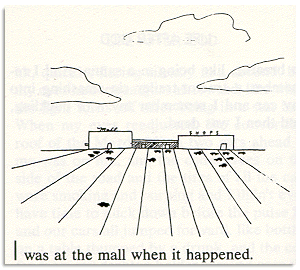JANUARY 25, 1999
A small percentage
of each purchase
you make at
amazon.com
via my recommendations
helps keep the
Picture of the Day
alive.
Order on Monday,
get it in time
for the weekend.
 |
|
 |
 |
Life
After God by Douglas Coupland
with illustrations by the author |
God is not the answer.
And neither is this book. Instead of offering answers,
Life After God contents itself with voicing fears
most of us are happy to ignore in a prose that is as economical yet evocative
as the simple line drawings which head each very short chapter. The text
and pictures exist in separate but equal worlds, like people, but, like people,
they benefit from the presence of one another. |
In a series of more or less related first-person narratives, we witness harrowing
remembrances of victims' final moments after the Bomb hits, bittersweet
recollections of love that faded like paint, and disturbing descriptions
of consciousness blunted by prescription medicine --all part of a litany
of worries and tribulations with which Coupland's
too-hip-for-their-own-health characters struggle to cope without the benefit
of faith. (The "God" of the title signifies the missing palliative for
human sorrow and might be replaced by "Meaning," "Community," or "College,"
depending on the experience and needs of the reader.) |
| |
 It's strange that a book about spiritual destitution at the
end of the millenium should be such a pleasure to read. It's the same pleasure
one derives from picking scabs, touching what shouldn't be touched. It hurts
a bit but also feels pretty good. Oddly, despite their morbid acuity, the
tales do not unsettle so much as they reassure, giving shape to the nebulous
fears we keep submerged--the scabs we do our best to ignore. It's strange that a book about spiritual destitution at the
end of the millenium should be such a pleasure to read. It's the same pleasure
one derives from picking scabs, touching what shouldn't be touched. It hurts
a bit but also feels pretty good. Oddly, despite their morbid acuity, the
tales do not unsettle so much as they reassure, giving shape to the nebulous
fears we keep submerged--the scabs we do our best to ignore.
As in
Tales from Generation X, it is the telling which
redeems, which offers hope: "These hands--the hands that care, the hands
that mold; the hands that touch the lips, the lips that speak the words--the
words that tell us we are whole." These too are the hands which pick scabs,
the hands that tug at old wounds to, in
Nathanael West's words, hurt the pain. But once peeled
away the scabs reveal smooth new skin underneath and the promise of
regeneration.
Despite nuclear paranoia, despite the dissolution of families, despite the
disruption of communities, despite the death of God (with a capital G, no
less!), despite the absence of meaningful work, it is our
human ability to share experience in words which bridges the abysses between us
and fills the voids within, which is why this book offers temporary solace
to anyone who thinks they're alone in fearing the world is on its last legs.
ability to share experience in words which bridges the abysses between us
and fills the voids within, which is why this book offers temporary solace
to anyone who thinks they're alone in fearing the world is on its last legs. |
|
|
|
|
|
